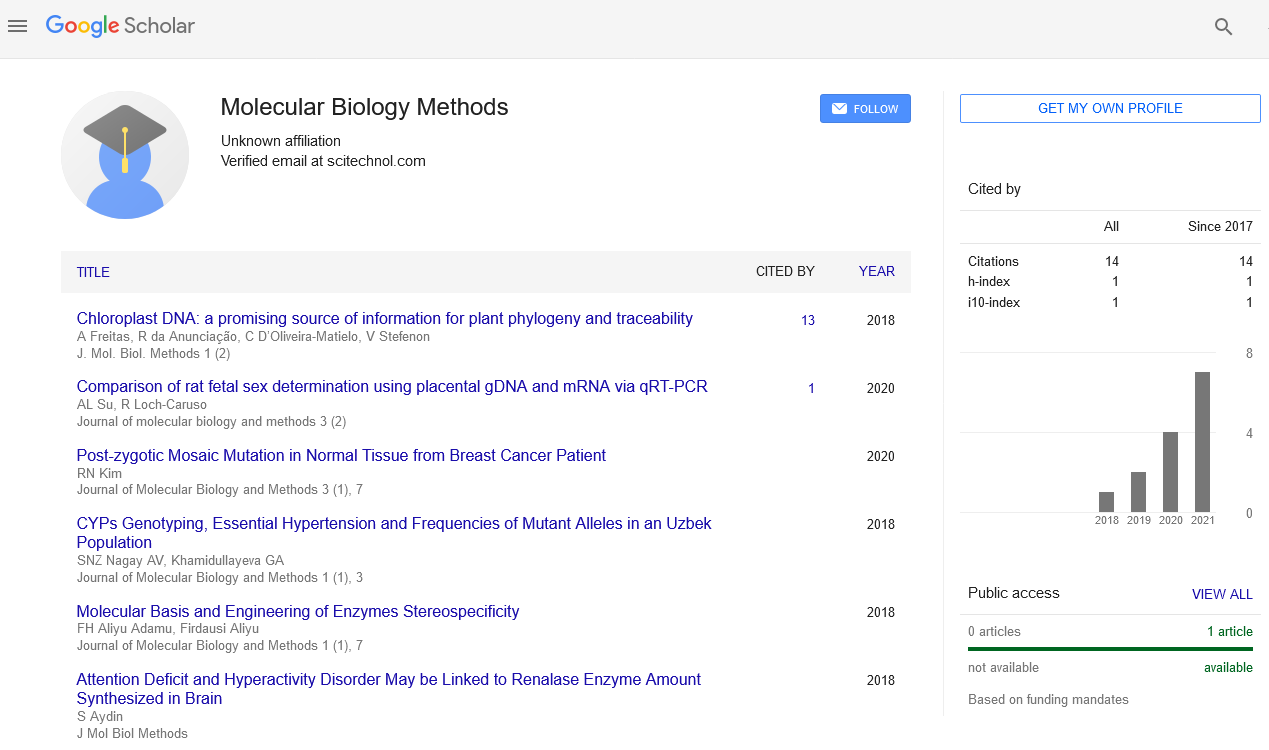Editorial, J Mol Biol Methods Vol: 4 Issue: 4
Organic Chemistry or Natural Science, is the Investigation of Compound Cycles Inside and Identifying with Living Organisms
Iñaki Arrotegui*
Department of Neurosurgery, Hospital General Universitario de Valencia, Valencia, Spain
*Corresponding author: Iñaki Arrotegui, Department of Neurosurgery, Hospital General Universitario de Valencia, Valencia, Spain, E-mail: athbio@yahoo.es
Received date: July 02, 2021; Accepted date: July 19, 2021; Published date: July 26, 2021
Keywords: Apoptosis, Biochemistry, Bioinformatics
Introduction
Organic chemistry or natural science is the investigation of compound cycles inside and identifying with living organisms. A subdiscipline of both science and science, natural chemistry might be partitioned into three fields: primary science, enzymology and digestion. In the course of the last many years of the twentieth century, organic chemistry has gotten effective at clarifying living cycles through these three disciplines. Practically all spaces of the existence sciences are being uncovered and created through biochemical approach and examination. Natural chemistry centers around understanding the synthetic premise which permits natural atoms to lead to the cycles that happen inside living cells and between cells thus relating enormously to the comprehension of tissues and organs, just as creature construction and function. Biochemistry is firmly identified with sub-atomic science, which is the investigation of the sub-atomic systems of natural wonders. A lot of natural chemistry manages the constructions, capacities, and connections of organic macromolecules, like proteins, nucleic acids, starches, and lipids. They give the design of cells and perform a large number of the capacities related with life. The science of the cell likewise relies on the responses of little particles and particles. These can be inorganic for instance, water and metal particles or natural for instance, the amino acids, which are utilized to orchestrate proteins. The instruments utilized by cells to tackle energy from their current circumstance through substance responses are known as digestion. The discoveries of organic chemistry are applied essentially in medication, nourishment and horticulture. In medication, organic chemists research the causes and fixes of diseases. Nutrition concentrates how to keep up with wellbeing and health and furthermore the impacts of dietary deficiencies. In horticulture, natural chemists examine soil and composts. Further developing yield development, crop stockpiling, and nuisance control are likewise objectives. At its most thorough definition, natural chemistry can be viewed as an investigation of the segments and structure of living things and how they meet up to become life. In this sense, the historical backdrop of organic chemistry may thusly return similarly as the old Greeks. However, organic chemistry as a particular logical discipline started at some point in the nineteenth century, or somewhat prior, contingent upon which part of natural chemistry is being cantered around. Some contended that the start of organic chemistry might have been the revelation of the main compound, diastase presently called amylase, in 1833 by Angele Payne, while others considered Eduard Buchner's first exhibition of a complex biochemical interaction alcoholic maturation in sans cell removes in 1897 to be the introduction of biochemistry. Some may likewise point as its starting to the persuasive 1842 work by Justus von Liebig, Animal science, or, Organic science in its applications to physiology and pathology, which introduced a substance hypothesis of digestion, or much prior to the eighteenth century concentrates on aging and breath by Antoine Lavoisier. Many different pioneers in the field who assisted with revealing the layers of intricacy of natural chemistry have been declared originators of current natural chemistry. Emil Fischer, who examined the science of proteins, and F. Gotland Hopkins, who considered catalysts and the powerful idea of natural chemistry, address two instances of early organic chemists. The expression "organic chemistry" itself is gotten from a blend of science and science. In 1877, Felix Hoppe-Seller utilized the term bohemia in German as an equivalent for physiological science in the foreword to the main issue of Festschrift für Physiologist Chemise where he contended for the setting up of establishments committed to this field of study. The German scientist Carl Neuberg anyway is frequently referred to have begat the word in 1903, while some attributed it to Franz Hofmeister. It was once commonly accepted that life and its materials had some fundamental property or substance (frequently alluded to as the "imperative standard unmistakable from any found in non-living matter, and it was imagined that lone living creatures could deliver the particles of life. In 1828, Friedrich Wöhler distributed a paper on his fortunate urea blend from potassium cyan ate and ammonium sulphate; some viewed that as an immediate defeat of vitalize and the foundation of natural chemistry. However, the Wöhler combination has started contention as some oddball the demise of vitalize at his hands. Since then, at that point, organic chemistry has progressed, particularly since the mid-twentieth century, with the improvement of new strategies like chromatography, X-beam diffraction, double polarization interferometry, NMR spectroscopy, radioisotopic naming, electron microscopy and sub-atomic elements reenactments. These procedures considered the disclosure and definite investigation of numerous atoms and metabolic pathways of the cell, for example, glycolysis and the Krebs cycle, and prompted a comprehension of natural chemistry on a sub-atomic level.
 Spanish
Spanish  Chinese
Chinese  Russian
Russian  German
German  French
French  Japanese
Japanese  Portuguese
Portuguese  Hindi
Hindi 